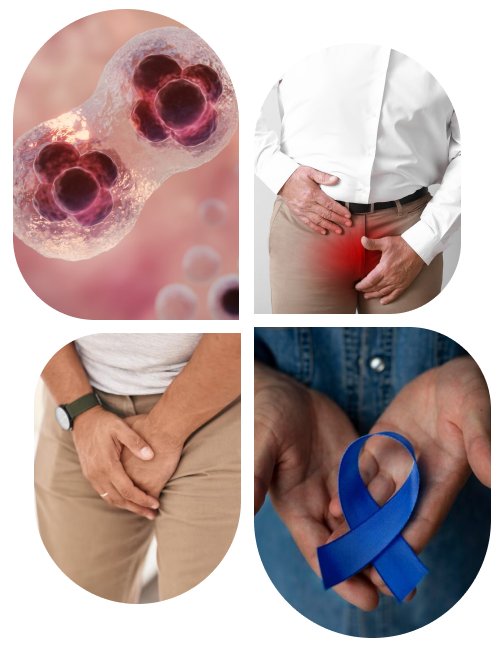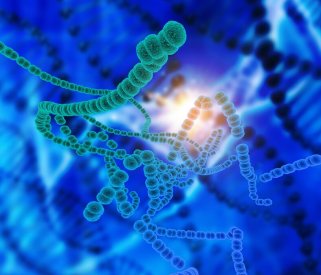
What is Prostate Cancer?
In prostate cancer, abnormal cells in the prostate grow uncontrollably and may form a tumour. This cancer can be slow-growing or more aggressive, and it may spread (metastasize) to other parts of the body, like nearby lymph nodes or bones.
Types of Prostate Cancer
- Adenocarcinoma
- Small cell carcinoma
- Transitional cell carcinoma
- Neuroendocrine tumors
Symptoms of Prostate Cancer
Prostate Cancer symptoms include:
Urinary problems:
Difficulty starting or stopping urination
Weak or slow urine flow
Frequent urination, especially at night
Blood in the urine
Pain and discomfort:
Pain or burning sensation during urination
Pelvic or lower back pain
Pain in the hips, thighs, or chest (indicating possible spread of cancer)
Sexual dysfunction:
Erectile dysfunction
Decreased libido
Causes of Prostate Cancer
Reach out to Dr Suvadip Chakrabarti, prostate cancer specialist, if you experience any of the aforementioned symptoms and identify with any of these causes.

Age
The risk of prostate cancer increases with age.

Family history
Having a father or brother with a history of prostate cancer raises your risk.

Genetics
Certain genetic mutations, such as those in the BRCA2 gene, can increase the risk.

Diet
Some studies suggest a link between a high-fat diet and increased risk.

Obesity
Being obese may increase the risk.

Lifestyle factors
Smoking and heavy alcohol consumption can also lead to prostate cancer.
The Stages of Prostate Cancer
Stage I and II: Localised Prostate Cancer
- Confined to the prostate: Cancer is contained within the prostate gland.
- No spread: The cancer has not spread to lymph nodes or other body parts.
Stage III: Locally Advanced Prostate Cancer
- Beyond the prostate: Cancer has grown outside the prostate gland, often into nearby tissues like the seminal vesicles.
- May or may not spread: Lymph node involvement may or may not occur at this stage.
Stage IV: Metastatic Prostate Cancer
- Spread to distant sites: Cancer has spread to distant parts of the body, such as bones, lungs, or liver.
A higher stage of cancer signifies a more advanced state of the disease.
Treatment for Prostate Cancer
Common treatment options for throat cancer include:
For early-stage, slow-growing cancers: Involves regular monitoring with blood tests and exams.
For more advanced cancers, the following procedures may be needed:
- Radical prostatectomy: This prostate cancer surgery comprises the removal of the prostate gland along with some of the nearby tissues.
- Transurethral resection of the prostate (TURP): This prostate cancer removal operation includes the elimination of excess prostate tissue to improve urine flow (not a cancer treatment but can be used to manage symptoms).
It is vital to understand that the prostate cancer treatment type majorly depends on the stage or intensity of the condition.
If you are suffering from prostate cancer, contact us for any medical attention or surgery-related queries. We prefer treating patients with robotic cancer surgery procedures over traditional methods for higher accuracy, quicker recovery, and lesser hospitalization duration.
How to Prevent Prostate Cancer
Follow these preventive measures to reduce your prostate cancer risk.
Maintain proper weight:
Obesity is connected to a rising risk of prostate cancer.Regular exercise:
Physical activity can help regulate your weight and well-being.Healthy diet:
Having fruits, vegetables, and whole grains while reducing the consumption of red meat and processed foods might be beneficial.Limit alcohol:
Excessive alcohol consumption can lead to an increased risk of various health problems, including prostate cancer.Avoid smoking:
Smoking is linked to a higher risk of several cancers, including prostate cancer.Early detection:
Regular prostate-specific antigen (PSA) tests and digital rectal exams can help detect prostate cancer early when treatment is more effective.Frequently Asked Questions (FAQs)

1. What are the symptoms of prostate cancer?
Early-stage prostate cancer often has no symptoms. When symptoms appear, they may include difficulty urinating, weak urine flow, blood in the urine, pain during urination, or erectile dysfunction.
2. How is prostate cancer diagnosed?
Prostate cancer is often detected through a PSA (prostate-specific antigen) blood test and a digital rectal exam (DRE). If abnormal results are found, a prostate biopsy may be performed.
3. How important is regular exercise for prostate health?
Regular physical activity can help maintain a healthy weight and overall well-being, which may contribute to prostate health.
4. Can prostate cancer be cured?
The possibility of a cure depends on the stage of the cancer when it’s diagnosed. Early-stage prostate cancer is often curable, while advanced-stage prostate cancer is usually managed rather than cured.
5. What is the role of diet in prostate cancer?
A diet rich in fruits, green vegetables, as well as whole grains may help reduce the risk of prostate cancer. Some studies suggest that limiting red meat and dairy products might also be beneficial.


